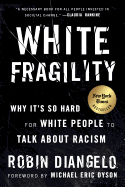
Antiracist educator Robin DiAngelo writes that white fragility--the defensive reactions of white people when they are challenged racially--is "triggered by discomfort and anxiety, it is born of superiority and entitlement." She dissects the phrase and its cultural implications to try to explain why it's so hard for many white people to talk about racism.
Carefully breaking down many of what she considers myths created by whites--such as claims of color-blindness, meritocracy and the belief that humans are objective beings--DiAngelo shows that racism is embedded in the culture. It isn't just a black-and-white issue of explicit hate or violence; she argues that all people are now born into an institutionalized system of racism and have no say about whether they will be affected by it. They are, however, responsible for their role. And for the white populations, this is unsettling; it disrupts the white equilibrium. To defend themselves from racist implications, they often react with anger, denial and withdrawal, instead of examining their behaviors and attempting to change them. This protective instinct shuts down the conversation and stops any advancement in race relations.
DiAngelo handles this potentially explosive topic with care and tact, even using examples of her own racist actions, but she is also forthcoming about its complexity and challenges. Efforts to make white people "comfortable" in the conversation erect further barriers to change. White Fragility is a book everyone should be exposed to. With any luck, most who are will be inspired to search themselves and interrupt their contributions to racism. --Jen Forbus, freelancer

